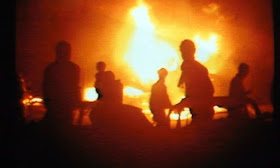The controversy has focused, in particular, on a memo signed by Oliver Letwin and a colleague. It advised the then Prime Minister, Maggie Thatcher, not to respond to that year’s riots by increasing investment in black communities, because the money would be frittered away on the “disco and drug trade.”
Those bright young men apparently viewed the proposal for a £10m communities programme aimed at dealing with inner-city problems, as little more than a means to “subsidise Rastafarian arts and crafts workshops”.
 |
| Tottenham riots in 1985 |
What makes this memo interesting is that Oliver Letwin is still firmly in politics, an MP and Minister, and a leading adviser to the present Prime Minister David Cameron, as he was to the Prime Minister back then.
It isn’t even the comments on black communities that I find most interesting. What he has to say about whites is, in many ways, far more illuminating still. He was clear that blacks oughtn’t to benefit from the riots, in particular because “lower-class unemployed white people had lived for years in appalling slums without a breakdown of public order on anything like the present scale.”
What’s so striking about these words is that Letwin clearly meant them as a compliment. It’s a good thing, in his world view, for people to accept life in “appalling slums.” They know their place, no doubt, and don’t disturb their betters by complaining to angrily which, in contrast to those nasty black rioters, makes them fine people. Not actually fine enough for a Tory government to want to help them at all, but fine enough to win applause, in a slightly condescending way, from the betters who keep them in their slums and are pleased not to be bothered by them too much.
It’s become something of a commonplace of English politics in recent years to assert that not enough is done for the white working class. There’s a lot of truth in that statement, if it’s taken at surface value – taken to mean exactly what it says. Unfortunately, it’s often code for “we really ought to accommodate the xenophobic and often racist views that certain elements within the white working class express.” Organisations like the far-right UKIP like to draw on that kind of bitterness. Sadly, however, many on the right of the Labour Party would like to counter UKIP by pandering to its anti-immigrant policies.
The approach that would allow Labour to remain true to its roots is quite different. And Letwin’s remarks show us the way. He talks about “lower-class unemployed white people” living in “appalling slums.” What does that suggest for Labour? It points us towards both a positive and a negative message.
The positive message is that we should push forward our commitment to build an economy that doesn’t leave you unemployed, or even unable to live adequately in a job, as happens today. And a commitment to building more, decent, affordable housing so that no one is forced to settle for a dire slum existence.
The negative message? That Letwin has let the cat out of the bag. Labour needs to hammer the point that the Tory Party’s perfectly happy to leave people unemployed, living in squalid slum environments. So if you want Labour to help you out of those conditions – stop voting Tory or UKIP and elect a Labour government to help us all.
Good of Letwin to have made that clear.












